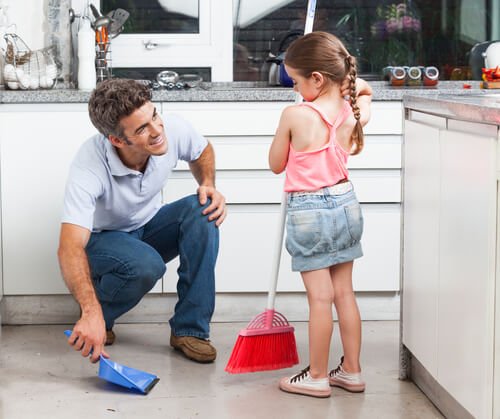25 Good Manners for Children to Know (Part 1)


Written and verified by preschool graduate Marisol Rendón Manrique
Good manners that children should know are modeled from the first years of life. As soon as they say their first words, it’s time to teach them how they should respond to certain situations.
The following are some of the behaviors that every parent wants to see in their child, but remember that these are behaviors that they imitate from you. Instead of telling them what actions are expected of them, show them by example how to act in each scenario.
Reasons to teach your children good manners
Good manners are correct habits that fit perfectly in all contexts and in all circumstances. If you put a little effort into instilling them during the early years, they’ll become automatic.
- Good manners stimulate social development. When a child learns good manners at a young age, they relate much more easily to both children and adults. Social skills are tools that children need in order to go out into the world successfully.
- Children learn to imitate positive role models. By repeating all your acts of politeness, children will become aware of people who can bring positive things into their lives, so avoid rude or vulgar behavior when you’re in front of them and apply each of the actions that you ask them to perform.
- Politeness is not an innate virtue in children, it requires practice and continuous reinforcement. A child with good manners can be more disciplined and have more tolerance for suggestions other people make that can affect their lives with a positive connotation.

Good manners for children to know
1. Whenever you’re going to ask anyone for a favor, ask someone for the time, or buy something at the store, the first thing you should say is “please”.
2. When receiving a gift or something requested from another person, it’s essential to say thank you.
3. When two or more people (whether adults or children) are talking, wait for them to finish before participating in the conversation. The only reason to interrupt another person’s conversation is if there’s an emergency situation.
4. When you need attention from another person, it’s not correct to get it by shouting or tugging on the person’s clothes. The most correct way to address another person is a polite word such as “excuse me”.
5. When there’s any doubt about the correct way to perform a certain action, you should ask for authorization or ask an adult for directions. This will prevent unnecessary corrections.
6. As a parent, keep negative comments about other people to yourself, especially when your children are present. If you avoid this type of behavior, you’ll prevent children from making embarrassing comments in social situations and teach them to focus on the qualities of others.
7. Avoid making derogatory comments about other people’s physical characteristics; make them only when they’re compliments or positive opinions and reflect politeness. Tolerance and respect for differences are two traits that we should develop in our children from the time they’re young.

8. When you’re in a social situation and a person that’s somewhat close to your family asks a question, you should always give an answer. Even if children are shy, they should be able to handle themselves appropriately in communicative contexts.
9. If you allow children to go to the home of one of their friends, teach them that they should respect the rules determined by the parents, be grateful for the attention received, and help the hosts to tidy up the spaces and the items they used during their playtime.
10. A closed door is a sign that one or more people need privacy, so you should knock on the door and always wait for an answer before entering a space so as not to barge into situations that don’t concern you.
Remember that good manners aren’t learned overnight. To get your children to put them into practice, you need to stimulate them daily for their good behavior and introduce them little by little, taking into account their age. Check in the second part of this article for other good manners that children should know.
Good manners that children should know are modeled from the first years of life. As soon as they say their first words, it’s time to teach them how they should respond to certain situations.
The following are some of the behaviors that every parent wants to see in their child, but remember that these are behaviors that they imitate from you. Instead of telling them what actions are expected of them, show them by example how to act in each scenario.
Reasons to teach your children good manners
Good manners are correct habits that fit perfectly in all contexts and in all circumstances. If you put a little effort into instilling them during the early years, they’ll become automatic.
- Good manners stimulate social development. When a child learns good manners at a young age, they relate much more easily to both children and adults. Social skills are tools that children need in order to go out into the world successfully.
- Children learn to imitate positive role models. By repeating all your acts of politeness, children will become aware of people who can bring positive things into their lives, so avoid rude or vulgar behavior when you’re in front of them and apply each of the actions that you ask them to perform.
- Politeness is not an innate virtue in children, it requires practice and continuous reinforcement. A child with good manners can be more disciplined and have more tolerance for suggestions other people make that can affect their lives with a positive connotation.

Good manners for children to know
1. Whenever you’re going to ask anyone for a favor, ask someone for the time, or buy something at the store, the first thing you should say is “please”.
2. When receiving a gift or something requested from another person, it’s essential to say thank you.
3. When two or more people (whether adults or children) are talking, wait for them to finish before participating in the conversation. The only reason to interrupt another person’s conversation is if there’s an emergency situation.
4. When you need attention from another person, it’s not correct to get it by shouting or tugging on the person’s clothes. The most correct way to address another person is a polite word such as “excuse me”.
5. When there’s any doubt about the correct way to perform a certain action, you should ask for authorization or ask an adult for directions. This will prevent unnecessary corrections.
6. As a parent, keep negative comments about other people to yourself, especially when your children are present. If you avoid this type of behavior, you’ll prevent children from making embarrassing comments in social situations and teach them to focus on the qualities of others.
7. Avoid making derogatory comments about other people’s physical characteristics; make them only when they’re compliments or positive opinions and reflect politeness. Tolerance and respect for differences are two traits that we should develop in our children from the time they’re young.

8. When you’re in a social situation and a person that’s somewhat close to your family asks a question, you should always give an answer. Even if children are shy, they should be able to handle themselves appropriately in communicative contexts.
9. If you allow children to go to the home of one of their friends, teach them that they should respect the rules determined by the parents, be grateful for the attention received, and help the hosts to tidy up the spaces and the items they used during their playtime.
10. A closed door is a sign that one or more people need privacy, so you should knock on the door and always wait for an answer before entering a space so as not to barge into situations that don’t concern you.
Remember that good manners aren’t learned overnight. To get your children to put them into practice, you need to stimulate them daily for their good behavior and introduce them little by little, taking into account their age. Check in the second part of this article for other good manners that children should know.
All cited sources were thoroughly reviewed by our team to ensure their quality, reliability, currency, and validity. The bibliography of this article was considered reliable and of academic or scientific accuracy.
- Orecchioni, C. K. (2004). ¿ Es universal la cortesía?. In Pragmática sociocultural: estudios sobre el discurso de cortesía en español (pp. 39-54). Ariel. https://dialnet.unirioja.es/servlet/articulo?codigo=2136813
- Suárez Palacio, P. A. (2018). El papel de la familia en el desarrollo social del niño: una mirada desde la afectividad, la comunicación familiar y estilos de educación parental. http://bibliotecadigital.iue.edu.co/jspui/bitstream/20.500.12717/2294/1/1046-Texto%20del%20art%C3%ADculo-4474-1-10-20200909.pdf
This text is provided for informational purposes only and does not replace consultation with a professional. If in doubt, consult your specialist.








